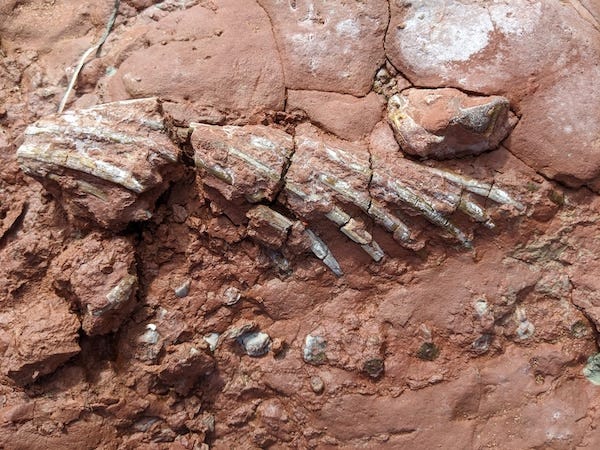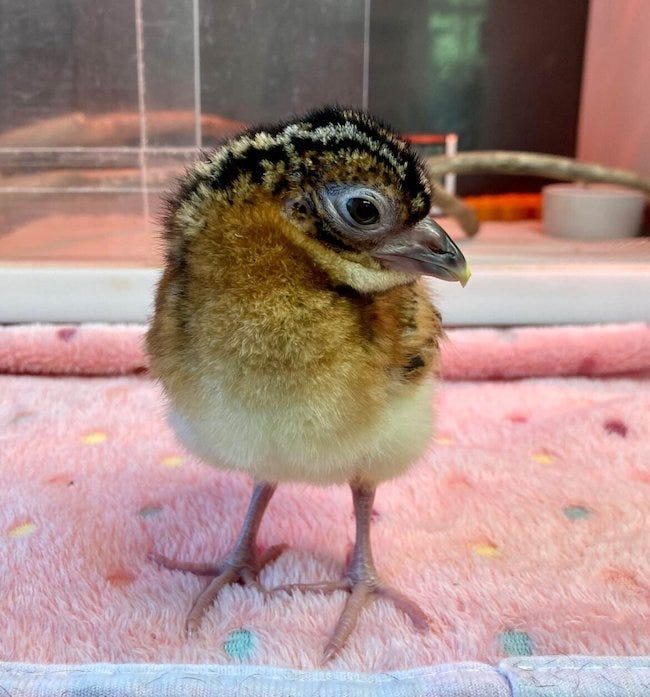The Weird Times: Issue 121, September 4, 2022 (V3 #17)
“Up to now, America has not been a good milieu for the rise of a mass movement. What starts out here as a mass movement ends up as a racket, a cult, or a corporation.”—Eric Hoffer, from The Temper of Our Time (1967)
“Sorrow eats time. Be patient. Time eats sorrow.”—Louise Erdrich
Following the Dinosaur Footprints
I follow the dinosaur footprints
on the dried riverbed
looking for a poem.
All the good poems are fossils
and no longer taught in MFA programs.
Poetry is an industry
fueled on fossil energy
for better or worse.
When do we go electric
again? Is that Bob Dylan
swinging his Nobel Prize?
This afternoon
I was reading Sei Shonagon
a lady-in-waiting; she reminds
me of my mother. People don't
change much.
—Miho Kinnas and E. Ethelbert Miller
Books and
The Moments from Serena Williams’s Career That I’ll Never Forget: Williams, who lost possibly her last match on Friday night, made herself felt beyond the game as arguably no player ever has, Gerald Marzorati, The New Yorker, 9/3/22
How a terrific collection of stories managed to escape Lithuania and survive: Chana Blankshteyn's work improbably emerges in a glorious new translation, Aviya Kushner, Forward, 8/30/22: Fear and Other Stories, translated by Anita Norich
Rio Cortez on Afropioneerism, Afrofrontierism, and Family Histories Real and Imagined: “The land where Utah exists haunts our story, but we are even more vast,” Rio Cortez, LitHub, 8/31/22: “In any field I am certain I can be seen by someone. How couldn’t I? When I’m blood-divided one hundred ways, when the God called DO NOT BOARD THE SHIP, when I’m protected by so many masters of the vine. They must be in here somewhere? They must see me this far into the desert, it can’t be that I am alone here. I search behind the cattails, I scramble the wood. Has it gotten darker?” from Golden Ax, 2022
How Abolition Feminism Fuels the Movement For Black Liberation: on Black Feminists' Fight Against the Carceral State, Mariame Kaba and Andrea J. Ritchie, LitHub, 9/1/22
El Alto: graphic novel depicts Bolivia city’s future as Indigenous and robotic: Altopía imagines the bustling working-class city that overlooks neighbouring La Paz in 2053 – with coca-chewing cyborgs and minibuses with legs, Thomas Graham, The Guardian, 8/29/22
The Collectors Who Save Video-Game History from Oblivion: Where does a game like Star Fox, Super Mario Bros., or Sharknado: The Video Game actually come from? Bijan Stephen, The New Yorker, 9/1/22
Survey finds young people follow news, but without much joy, David Bauder, AP News, 8/31/22 (Ed. Note: does any of us follow the news today with joy?)
“Blister in the Sun” Is Really About…Robert Matvan, Culture Sonar, 8/30/22
‘It’s a completely new day’: the rise of Indigenous films and TV shows: Successes such as Prey and Reservation Dogs highlight an important shift for a community who have been demonised and under-represented on screen, Adrian Horton, The Guardian, 9/3/22
There is nothing in my hand except a certain
grasping. In my mind’s eye, I am
stroking your hair with damp fingertips. This is exactly
how it happened. On the lit-up hotel bed,
I remember thinking, My body is a lens
I can look through with my mind.
—from “On Seeing and Being Seen,” Ama Codjoe
Science and Environment
Greenland ice sheet set to raise sea levels by nearly a foot, study finds: New research suggests the massive ice sheet is already set to lose more than 3 percent of its mass, even if the world stopped emitting greenhouse gases today, Chris Mooney, Washington Post, 8/29/22
Melting Himalayan Glaciers Alter Water Supplies Near and Far: The retreat means countries like Nepal and Bangladesh, which rely on these mountain water cycles, will have to adapt, Zakir Hossain Chowdhury, Undark, 8/29/22
‘We’re going to pay in a big way’: a shocking new book on the climate crisis: In An Inconvenient Apocalypse, authors Wes Jackson and Robert Jensen write that society needs to be better prepared for an inevitable collapse, Veronica Esposito, The Guardian, 8/31/22: her book is An Inconvenient Apocalypse
The Long, Leguminous Quest to Give Crops Nitrogen Superpowers: Farmers have to apply heaps of emissions-heavy fertilizer to provide crops with enough nitrogen. Scientists are looking to legumes for help, Matt Simon, Wired, 8/30/22
Costs of climate change far surpass government estimates, study says: The new comprehensive analysis pegs the social cost of carbon at $185 a ton — more than triple the current federal standard, Dino Grandoni, Brady Dennis, Washington Post, 9/1/22
A centuries-old cactus survived everything. Then summer rains came, Derek Hawkins, Washington Post, 8/31/22” “It’s sort of like if the Mona Lisa had been impaled somehow.”
The Surreal Abundance of Alaska’s Permafrost Farms: In a place where the summer sun shines for twenty-one hours a day, climate change is helping to turn frozen ground into farmland, Yasmin Tayag, The New Yorker, 8/30/22
Gene editing could revive a nearly lost tree. Not everyone is on board: Saving the American chestnut could restore a piece of history, resurrect a lost ecosystem and combat climate change. But critics say it would come at a cost, Dino Grandoni, Washington Post, 8/30/22
Discovered in the deep: the incredible fish with a transparent head, Helen Scales, The Guardian, 8/31/22: “The rare barreleye fish tracks its prey with extremely light-sensitive rotating eyes encased in a see-through canopy.”
Humpback Whales Pass Their Songs Across Oceans: Whales share songs from Australia to Ecuador, scientists have found, suggesting a remarkably fast cultural evolution, Carl Zimmer, NY Times, 8/30/22 (free to read)
Greenhouse Gas And Sea Levels Hit Record Highs in 2021, Scientists Report, AFP, Science Alert, 9/2/22
Greenland’s Melting Glaciers Spew a Complicated Treasure: Sand: Meltwater from the island’s ice sheet is loaded with the right kind of sand for concrete production—which further warms the planet, Matt Simon, Wired, 9/1/22
Study Finds that Mississippi River Basin Could be in an ‘Extreme Heat Belt’ in 30 Years: A climate study released during one of the hottest summers on record predicts a 125-degree “extreme heat belt” will stretch across a quarter of the country by 2053. The hottest cities, according to the study, will be Kansas City, Missouri; St. Louis; Memphis, Tennessee; Tulsa, Oklahoma; and Chicago, Keely Brewer, The Daily Memphian, Eva Tesfaye, Inside Climate News, 9/2/22
Night-time heat is killing crops. Scientists are rushing to find resilient plants: Night temperatures are rising fast, and that’s a problem for rice and other critical crops, which have fewer defenses at night, Olivia Paschal, The Guardian, 9/1/22
Could Climate Change Alter the Length of the Day? Global warming is melting Earth’s glaciers, which is moving vast amounts of water—maybe enough to affect the planet’s rotation, Rhett Allain, Wired, 9/2/22
Australia’s epic wildfires expanded ozone hole and cranked up global heat: Smoke from the unprecedented 2020 fires increased temperatures in the stratosphere by 3 °C in some places, Jude Coleman, Nature, 9/1/22
Civil disobedience by scientists helps press for urgent climate action, Stuart Capstick et al, Nature, 8/29/22: “Time is short to secure a liveable and sustainable future; yet, inaction from governments, industry and civil society is setting the course for 3.2 °C of warming, with all the cascading and catastrophic consequences that this implies. In this context, when does civil disobedience by scientists become justified?”
A New Approach to Car Batteries Is About to Transform EVs: Auto companies are designing ways to build a car’s fuel cells into its frame, making electric rides cheaper, roomier, and able to hit ranges of 620 miles, Mark Andrews, Wired, 8/29/22
Decade of the battery: Predicting the technology that will define the next era of innovation, Noah Smith, Noahpinion, 8/29/22
Massachusetts neighborhood to get networked geothermal system: It will be the first community in the country to try the approach, YCC Team, Yale Climate Connections, 8/31/22
Bacteria’s Immune Sensors Reveal a Novel Way to Detect Viruses: A new study reveals that bacteria can fight viruses in a surprisingly elegant way that has no known counterpart in more complex life, Annie Melchor, Quanta, 8/29/22 “Bacteria have not stopped teaching us. They taught us about DNA replication, they taught us about DNA repair, they taught us about cell division, and now they can teach us about immunity.”
Ultraprocessed foods linked to cancer and early death, studies find, Sandee LaMotte, CNN, 9/1/22
With Old Traditions and New Tech, Young Inuit Chart Their Changing Landscape: For generations, hunting, and the deep connection to the land it creates, has been a mainstay of Inuit culture: As the coastline changes rapidly—reshaping the marine landscape and jeopardizing the hunt—Inuit youth are charting ways to preserve the hunt, and their identity, Cheryl Katz, Hakai, 8/30/22
15 Big Issues Poised to Impact Oceans and Coast: Experts from around the world put their heads together to consider effects of emerging trends on marine and coastal biodiversity, Mary Hoff, Ensia, 9/1/22: “Fire Fallout, Dark Matter, Pole Shift, Lithium Water,” and more….
Coolest Story of the Week: Woman on beach finds fossil from unknown animal likely older than dinosaurs: ‘It is likely a reptile or a close relative,’ scientist John Calder said about the extremely rare fossil found on a beach in Canada, Cathy Free, Washington Post, 9/2/22
Death is coming for us all, but not today
Today you're living it, hey, you're really feeling it
Give it everything you've got knowing that you can't take it with you
And all you ever needed to exist has always been within you
Gimme some of that good stuff that human spirit
Cut it with a hundred percent endurance
—from “100% Endurance” by Yard Act, written by Ryan Needham/Sam Shipstone/James Anthony Smith
Politics
Mike Davis, California’s ‘prophet of doom’, on activism in a dying world: ‘Despair is useless:’ His warnings of ecological and social breakdown have proved accurate. But with months to live, Davis is anything but defeated, Lois Beckett, The Guardian, 8/31/22
Behind the ‘economic policy’ façade, it’s class war, Richard D. Wolff, Intrepid Report, 8/31/22: “Fiscal policies work quite like monetary policies in terms of the class favoritism built into them.”
Esther Jackson, 105: Life reflected the 20th century struggle for equality, Timothy V. Johnson, People’s World, 8/30/22: “As the founding editor of Freedomways, Esther Cooper Jackson helped create one of the most significant publications of the radical Black left in the 1960s.”
The US has a ruling class – and Americans must stand up to it: In the year 2022, three multibillionaires own more wealth than the bottom half of American society – 160 million Americans. This is unsustainable, Bernie Sanders, The Guardian, 9/2/22
Utah schools are adopting new book-banning procedures, Erin Alberty, Axios, 8/29/22: “Schools are no longer allowed to ignore complaints — and they now have to actively explain to lawmakers their decision to keep any book that someone targets.”
The Case for Prosecuting Donald Trump: Nobody is above the law, not even the former president, Jed Shugerman, Alan Z. Rozenshtein, Persuasion, 8/31/22: “… the DOJ should remain committed to the basic principles of liberal democracy. And there is no more basic principle in our society than that no one, not even the president, is above the law.”
Billions in ‘dark money’ is influencing US politics. We need disclosure laws: A donor secretly transferred $1.6bn to a Republican political group. Because of America’s lax laws, the donation was never disclosed in any public record or database, David Sirota, Joel Warner, The Guardian, 8/29/22
Why billionaire John Malone’s shadow looms over CNN: One of the world’s most powerful news outlets has a new mandate — which happens to sync with the views of one of the world’s richest men, Peter Kafka, Daily Beast, 8/26/22
Birds
Birds migrate along ancient routes – here are the latest high-tech tools scientists are using to study their amazing journeys, Tom Langen, The Conversation, 9/2/22
These Cool Birds Will Make You Want to Get Into Birding: As well as everything you never knew you wanted to know about them, Mike Unwin, The Daily Beast, 9/2/22: Around the World in 80 Birds
Amazing technology defies incalculable odds to identify bird migrations, Bob Duchesne, Bangor Daily News, 9/1/22
What's that in the sky after dark? 48.4 million birds migrated across Wisconsin overnight Tuesday. Radar helps reveal the facts, Paul A. Smith, Milwaukee Journal Sentinel, 9/1/22
Should you feed garden birds? Feeding stations can be dangerous places for garden birds, but there are other ways to help them, Chris Baraniuk, BBC, 8/31/22
How Bird Researchers Are Tracking the Impacts of Intensifying Hurricane Seasons: As climate change fuels stronger storms, scientists are using emerging technology and crowdsourcing data to understand their avian toll, Jason Gregg, Audubon, 8/31/22
‘Chick’ this out: Pair of ‘critically endangered’ birds hatches at National Zoo, Matt Small, WTOP, 9/1/22: “Blue-billed curassows, which are native to Colombia, are considered “critically endangered” by the International Union of Conservation of Nature.”
“And so poetry is not a shopping list, a casual disquisition on
the colors of the sky, a soporific daydream, or bumpersticker
sloganeering. Poetry is a political action undertaken for the sake
of information, the faith, the exorcism, and the lyrical invention,
that telling the truth makes possible. Poetry means taking
control of the language of your life. Good poems can interdict
a suicide, rescue a love affair, and build a revolution in which
speaking and listening to somebody becomes the first and last
purpose to every social encounter.”
—June Jordan
“Of all the nasty outcomes predicted for women's liberation...none was more alarming than the suggestion that women would eventually become just like men.”—Barbara Ehrenreich
Barbara Ehrenreich, author who resisted injustice, dies aged 81, Ed Pilkington, The Guardian, 9/2/22
“I never did give anybody hell. I just told the truth and they thought it was hell.”—Harry Truman
On September 5, 1882, 10,000 to 20,000 workers marched across lower Manhattan in the first U.S. Labor Day parade.
“There goes my hero
Watch him as he goes
There goes my hero
He's ordinary”
—from “My Hero,” Foo Fighters, by David Eric Grohl/Nate Mendel/Pat Smear
Summer ends when school begins, even though September 22 is the “official” end of summer this year. This is a time of worry and concern for so many. Disasters abound, danger is in the air.
The news about our planet’s all-too-rapidly changing environment is overwhelming right now. I’d propose that “climate change” is simply not a strong enough term for what we are experiencing. We feel large scale disaster looming ahead, much sooner, much more intense, much more widespread than we have imagined before.
There is so much happening that we can’t keep up. But we cannot turn away. We must prepare for what is to come, we must work toward adapting to the inevitable large scale disruptions to our lived environment, whatever that may be.
"The moment we act as if it's true, then it's true."‒ Richard Wright (born 9/4/1908)
“What keeps us going, ultimately, is our love for each other, and our refusal to bow our heads, to accept the verdict, however all-powerful it seems. It’s what ordinary people have to do. You have to love each other. You have to defend each other. You have to fight.”—Mike Davis
Keep fighting. Love to all. Keep in touch. —David






